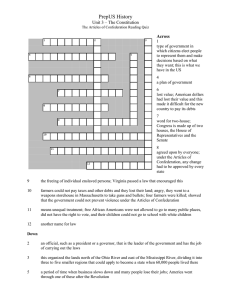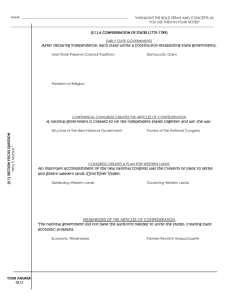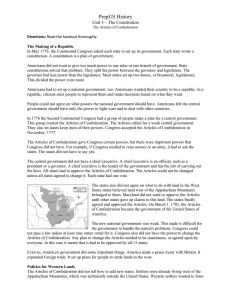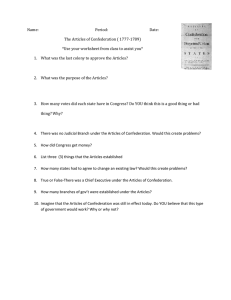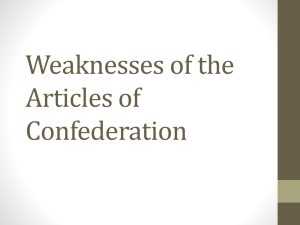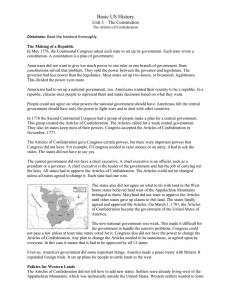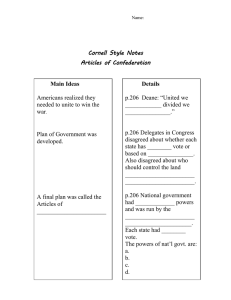PrepUS History Unit 2 – The Constitution
advertisement
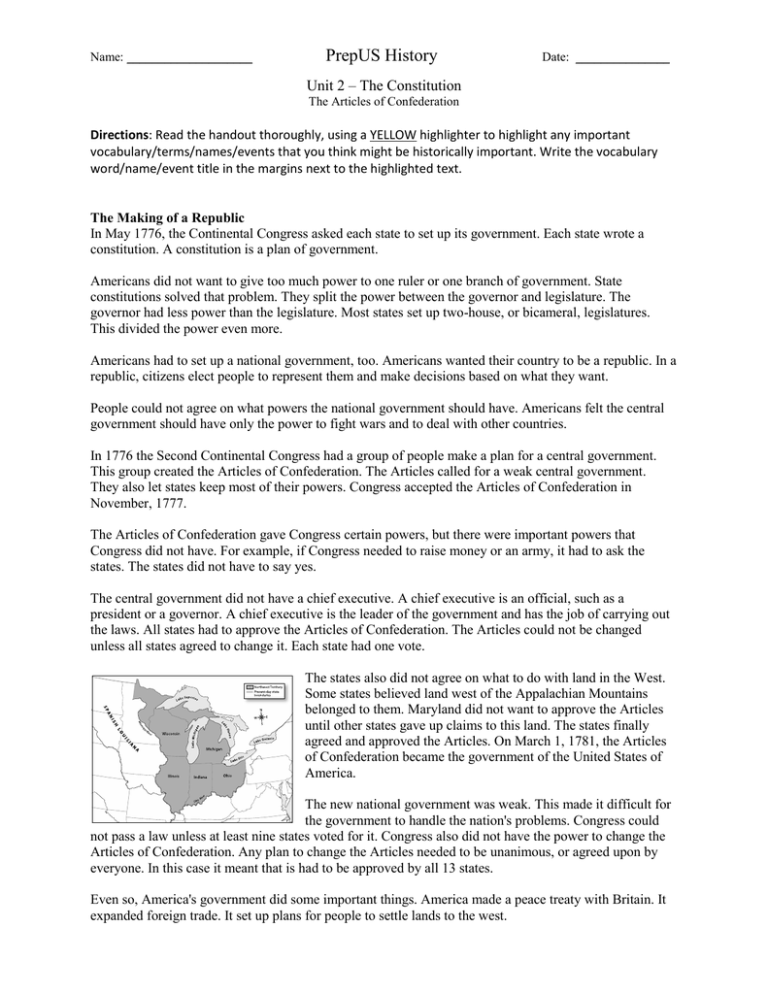
Name: ____________________ PrepUS History Date: _______________ Unit 2 – The Constitution The Articles of Confederation Directions: Read the handout thoroughly, using a YELLOW highlighter to highlight any important vocabulary/terms/names/events that you think might be historically important. Write the vocabulary word/name/event title in the margins next to the highlighted text. The Making of a Republic In May 1776, the Continental Congress asked each state to set up its government. Each state wrote a constitution. A constitution is a plan of government. Americans did not want to give too much power to one ruler or one branch of government. State constitutions solved that problem. They split the power between the governor and legislature. The governor had less power than the legislature. Most states set up two-house, or bicameral, legislatures. This divided the power even more. Americans had to set up a national government, too. Americans wanted their country to be a republic. In a republic, citizens elect people to represent them and make decisions based on what they want. People could not agree on what powers the national government should have. Americans felt the central government should have only the power to fight wars and to deal with other countries. In 1776 the Second Continental Congress had a group of people make a plan for a central government. This group created the Articles of Confederation. The Articles called for a weak central government. They also let states keep most of their powers. Congress accepted the Articles of Confederation in November, 1777. The Articles of Confederation gave Congress certain powers, but there were important powers that Congress did not have. For example, if Congress needed to raise money or an army, it had to ask the states. The states did not have to say yes. The central government did not have a chief executive. A chief executive is an official, such as a president or a governor. A chief executive is the leader of the government and has the job of carrying out the laws. All states had to approve the Articles of Confederation. The Articles could not be changed unless all states agreed to change it. Each state had one vote. The states also did not agree on what to do with land in the West. Some states believed land west of the Appalachian Mountains belonged to them. Maryland did not want to approve the Articles until other states gave up claims to this land. The states finally agreed and approved the Articles. On March 1, 1781, the Articles of Confederation became the government of the United States of America. The new national government was weak. This made it difficult for the government to handle the nation's problems. Congress could not pass a law unless at least nine states voted for it. Congress also did not have the power to change the Articles of Confederation. Any plan to change the Articles needed to be unanimous, or agreed upon by everyone. In this case it meant that is had to be approved by all 13 states. Even so, America's government did some important things. America made a peace treaty with Britain. It expanded foreign trade. It set up plans for people to settle lands to the west. Policies for Western Lands The Articles of Confederation did not tell how to add new states. Settlers were already living west of the Appalachian Mountains, which was technically outside the United States. Western settlers wanted to form new states and join the Union. Congress needed to give people a way to settle the Western lands and form new states. In 1785, the Confederation Congress passed an ordinance, or law, about western lands. This law set up a way to divide and then sell the western lands. Land was divided into townships. Land in the township was divided into smaller sections. These sections were sold to settlers. In 1787, the Northwest Ordinance created the Northwest Territory. This territory included lands north of the Ohio River and east of the Mississippi River. The lands were divided into three to five smaller territories. A territory could apply to become a state when 60,000 people lived there. New states would have the same rights as the original 13 states. Settlers had a bill of rights. They had freedom of religion and trial by jury. The bill of rights said there could be no slavery in the Northwest Territory. The Land Act of 1800 was passed to make it easier for people to buy land in the Northwest Territory. Some settlers did not have all of the money needed to buy land. The Act made it possible for people to pay for the land over a period of four years. Problems at Home and Abroad The national government had problems paying its bills. By 1781, American dollars, called Continentals, had depreciated, or lost value. They were worth almost nothing. The War for Independence left the Continental Congress with a large debt. Congress did not have the power to raise taxes to pay these debts. In 1781, Congress created a department of finance, led by Robert Morris. Morris made a plan to charge a 5 percent tax on goods brought in from other countries to help pay the debts. All 13 states had to approve Morris' plan for it to pass, but Rhode Island voted no. The plan did not pass. The new government faced other problems. The British did not let Americans trade in the West Indies and other British areas. British soldiers were still in several important forts in the Great Lakes region. The American government had problems with Spain, too. Spain controlled Florida and lands west of the Mississippi River. Spain wanted to stop America's growth in Spanish territory. In 1784, Spain closed the lower Mississippi River to American shipping. Western settlers could no longer use the river for trade. It became clear that the Confederation was not able to deal with major problems. Americans came to agree that their new country needed a stronger government. The Need for Change The Articles of Confederation created a weak national government. This made it difficult for the government to deal with the nation’s problems. The United States went through a depression after the American Revolution. A depression is a period of time when business slows down and many people lose their jobs. The government had little money. The money it had was used to pay debts to foreign countries. There was not enough money in the United States. 2 The slow economy meant farmers sold less of their goods. Some farmers could not pay taxes and other debts. As a result, state officials took over their land and put many of them in jail. Farmers grew angry over this treatment. In 1787, Daniel Shays led a group of angry farmers to a weapons storehouse in Springfield, Massachusetts. The farmers wanted to take guns and bullets. The state militia ordered the farmers to stop. They fired their guns into the air. The farmers did not stop. The militia fired again and killed four farmers. Shays and his followers ran away. The rebellion ended. Americans were worried that the government could not prevent violence. The American Revolution was based on freedom. This caused some Americans to believe that slavery should be outlawed. Several northern states began passing laws to end slavery. Free African Americans faced discrimination even in states that did not have slavery. They were not allowed to go to many public places. Few states gave them the right to vote. The children of most free African Americans could not go to school with white children. Some slaveholders freed their slaves after the American Revolution. Virginia passed a law that encouraged manumission, the freeing of individual enslaved persons. The number of free African Americans grew in that state. Even with these efforts, slavery was still a key part of life in Southern states. Southern plantations depended on slave labor. Many white Southerners were afraid that their economic system would die without slavery. The issue of slavery began to divide Northerners and Southerners. NOW - go back through the reading and use a different colored highlighter to highlight as directed below, marking the text with the associated number. 1. Highlight the word constitution and its definition. 2. Highlight the word bicameral and its definition. 3. Highlight the word republic and its definition. 4. Highlight the word chief executive and its definition. 5. Highlight the word unanimous and its definition. 6. Highlight the word ordinance and its definition. 7. Highlight how a western district could apply to become a state. 8. Highlight the word depreciated and its definition. 9. Highlight the word depression and its definition. 10. Highlight the word manumission and its definition. NOW answer these questions using correct spelling and grammar and complete sentences. 11. What were three weaknesses of the Articles of Confederation? _____________________________________________________________________________________ _____________________________________________________________________________________ _____________________________________________________________________________________ _____________________________________________________________________________________ _____________________________________________________________________________________ 3 12. Why was it difficult for the new government to pay debts from the American Revolution? _____________________________________________________________________________________ _____________________________________________________________________________________ _____________________________________________________________________________________ _____________________________________________________________________________________ _____________________________________________________________________________________ 13. Why did Spain close the lower Mississippi River to American shipping in 1784? _____________________________________________________________________________________ _____________________________________________________________________________________ _____________________________________________________________________________________ _____________________________________________________________________________________ _____________________________________________________________________________________ 14. Why did farmers in Massachusetts rebel in 1787? _____________________________________________________________________________________ _____________________________________________________________________________________ _____________________________________________________________________________________ _____________________________________________________________________________________ _____________________________________________________________________________________ 15. Identify three ways in which free African Americans faced discrimination. _____________________________________________________________________________________ _____________________________________________________________________________________ _____________________________________________________________________________________ _____________________________________________________________________________________ _____________________________________________________________________________________ 4

